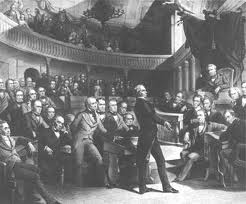 A review of Merrile D
Peterson’s The Great Triumvirate: Webster, Clay, and Calhoun (1987)
A review of Merrile D
Peterson’s The Great Triumvirate: Webster, Clay, and Calhoun (1987)(Rating 4 of 5)
In my earlier review of the Last Crusade I discussed
how often unsuccessful presidents are in many respects successful
statesmen. This also holds true for even
those great statesmen (and stateswomen) that fall short of the presidential honor. My home state of Maine’s Ed Muskie would
clearly qualify as a great statesman in the eyes of most Mainers. Daniel Webster, Henry Clay, and John C.
Calhoun were three of the most prominent men of their era. Each had a mass following in their respective
region: Webster the Northeast, Clay the West, and Calhoun the South.
Despite
their large followings none of these men would ever reach the highest point in
American politics, to be President. Like
Muskie, each one these statesmen would become Secretary of State and Webster
would be hold that post twice. At the
start of the Republic good service in that office almost guaranteed the
presidency[1]. Calhoun would become the Vice President, and
Clay, among the three, would have the best chance of winning the coveted office,
but all would fail.
This book,
covering political careers of all three, does a fairly good job of its
task. Although it can get convoluted at
times, reading a duel biography is hard enough a trio-biography is very
difficult. However, the author does a
good job staying on task. There are
moments where Peterson’s clear worship of these three gets a bit nauseating.
“In 1832, when they came together in the Senate for the first time and coalesced in opposition to the president, Andrew Jackson, the idea of ‘The Great Triumvirate’ was born. It was the offspring of the feverish Jacksonian imagination, for the prospect was very small of these master spirits—Webster, Clay, Calhoun—uniting in power like the famed Roman triumvirs who ruled after Caesar’s death. Yet had they become a triumvirate in fact, what worlds they might have conquered!” (p.5)
Clay and
Webster, in my eyes, have very positive legacies.
There were things that they did and positions that they took that I
strongly disagree with—the Fugitive Slave Act as part of the Compromise of 1850,
for example—but over all I believe the two were positive forces in our nation’s
history. However, if one would take a more position, that person could argue all Clay and Webster really did was delay
important issues repeatedly to the next generation instead of dealing with it
themselves. I think that Clay and Webster did the best they could with the situation that they were given.
The third
member however is a different story.
Generally speaking I tend to judge historical figures by the standards
of their own time not ours. If I did the
later, and was honest with myself, I would have to say everyone who ever made
major decisions in the world was evil until I enter High School then it was
just most of them. However, in American
history, there are four historical figures that I completely despise and John
C. Calhoun is one of them[2].
I find
absolutely no redeemable traits in Calhoun. The only nice thing I can say about the man
was if I had died in 1823 his death would have gone down as a tragic loss of a young
great statesman. Unfortunately, he lived
into the 1850s and became the champion of all that was wrong with America at
that time: slavery, nullification, and secession. An American villain if there
ever was one.
“And so Webster, Clay, and Calhoun, the legitimate successors of Washington, Adams, and Jefferson, never attained the presidency. When the last of this ‘second race of giants’ passed away in 1852 nothing was left to challenge the sway of Lilliputians. The republic lost its glory—the regalia of great statesmen.” (p.6)
I totally disagree with the above statement. I am sorry
but there were plenty of great statesmen to follow them. I really do not feel these three were Founders’
natural successors. Do not get me wrong
they had their accomplishments. Their
end, however, was not the end of great statesmen.
In fact if you read Team of Rivals you can see the next
generation of leaders was, in many ways, superior to this group.












No comments:
Post a Comment
Please feel free to leave a comment on any article at anytime, regardless how long ago I posted it. I will most likely respond.